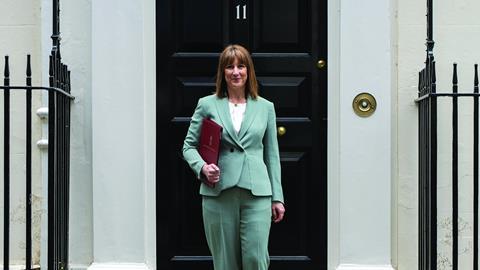The chancellor’s Spending Review pledged more cash for the criminal courts, the CPS and the probation service. Justice has been a ‘cinderella’ department for years, so is this finally changing?
Justice spending peaked in 2007-08 and then crashed after Lehman Brothers folded and austerity took hold in the subsequent decade. So context is everything when analysing chancellor Rachel Reeves’ Spending Review.
The purse strings have loosened at the Ministry of Justice in recent years. Yet real-terms day-to-day spending by the MoJ this year will still be about 25% lower in per-person terms than it was before the financial crisis, according to the Institute for Fiscal Studies. England and Wales accommodate over six million more people than they did in 2007.
Nevertheless, after so many years of meagre rations, it was understandable that lawyers’ bodies would react favourably to Reeves’ relative largesse. Especially as unprotected departments including the MoJ were acutely vulnerable.
Day-to-day spending by the ministry will grow by an average of 1.8% a year in real terms between the 2025-26 financial year and 2028-29. The budget will climb from £11.9bn in 2025-26 to £12.6bn in 2026-27, and then to £12.9bn in 2027-28 and £13.2bn in 2028-29.
Capital spending will rise from £2bn in 2025-26 to £2.3bn in each of the following three years – primarily to fund more prison places – before falling back to £2bn in 2029-30.
The government outlines its priorities in HM Treasury papers. Reeves committed up to an extra £450m a year to the courts system by 2028-29. This will ‘increase Crown court sitting days to record levels’ and help implement the forthcoming recommendations of Sir Brian Leveson’s review of the criminal courts, she said.
The Probation Service will receive up to £700m in extra funding per year by 2028-29 compared with 2025-26. This will ‘deliver the transformative reforms’ recommended in former lord chancellor David Gauke’s Independent Sentencing Review.
Read more
Law officers’ departments, meanwhile, will see total funding rise from £1.1bn this year to £1.3bn in 2028-29. Day-to-day spending will rise by £160m in real terms from 2023-24 to 2028-29. This ‘will provide record investment into the Crown Prosecution Service to bring criminals to justice, with total funding of £1bn in 2028-29. The CPS will recruit more Crown advocates and frontline staff to prosecute cases, build workforce capacity and capability, and improve the quality and efficiency of prosecutions.’
The numbers must be caveated by the 5% efficiency and productivity ‘savings’ that Reeves ordered departments to identify when setting their budgets for 2026-27 to 2028-29. These include ‘reductions to back-office headcount’ and using AI to reduce administrative costs. The MoJ has also worked with the Office for Value for Money to identify £360m of ‘technical efficiencies’ by 2028-29.
It is surely not coincidental that the MoJ’s headquarters at 102 Petty France is to close for good as part of the government’s agenda to make the civil service less ‘London-centric’.
Law Society president Richard Atkinson said the review gives the public hope that the justice system is a growing priority: ‘However, all parts of the justice system have been starved of investment for decades. It will take long-term sustained funding to fix it, including in civil and criminal legal aid to address the crises there.
‘The consequences of the neglect are plain for all to see. There are crumbling courtrooms and antiquated IT systems, huge backlogs delaying criminal court cases to 2029 and thousands of children in legal limbo due to family court delays. Prisons are overcrowded and there are chronic shortages of legal aid lawyers.
‘Families, victims and business need justice to be prioritised. The government must invest across the system, reducing pressure on the courts, by focusing on early advice and out-of-court resolution.’
Kirsty Brimelow KC, vice-chair of the Bar Council, said: ‘The real-terms increase in Ministry of Justice funding is a welcome recognition by the government that justice is a key public service. Money for increasing court capacity, tackling court backlogs, and implementing the recommendations from the Independent Review of Criminal Courts are signs of listening by government to our voices from the courts.’
She added: ‘We hope that the details of the settlement for the courts will address the need for further support for the criminal bar, including the implementation of legal aid increases which will assist retention, as well as additional support for both the civil and family bar, covering legal aid and early legal advice.’
This article is now closed for comment.
































1 Reader's comment